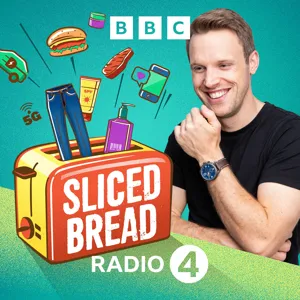Podcast Summary
Steam generator irons: Steam generator irons, with their larger water capacity, more powerful steam, and premium price point, help maintain profitability for the iron industry despite sales decline due to changing consumer habits and the pandemic.
Despite the decline in sales due to changing consumer habits and the pandemic, the iron industry remains a significant market worth over 3.4 billion pounds in the UK alone. Manufacturers have responded to this challenge by introducing steam generator irons, which offer more water capacity, more powerful steam, and a premium price point. These innovations have helped to maintain profitability in the industry, as people continue to seek effective solutions for dealing with wrinkles in their clothing. The history of ironing dates back thousands of years, but the introduction of electrically heated steam irons a century ago marked a major advancement in this area. Today, steam generator irons represent the latest evolution in this product category, offering improved efficiency and a premium experience for consumers.
Irons and garment care preferences: Preferences for irons and garment care vary greatly among cultures and consumers, with some favoring traditional methods like dry irons and others opting for high-performing models and eco-friendly alternatives like garment steamers.
The market for irons and garment care remains significant and diverse, with cultural and practical factors influencing preferences among consumers worldwide. For instance, in countries like Indonesia, there's a strong affinity for dry irons due to tradition and energy considerations. In contrast, consumers in Poland frequently use irons for various items, including bed sheets and curtains, and are willing to invest in high-performing models. Manufacturers like Phillips have addressed common concerns, such as the fear of burning clothes, by introducing technologies like optimal temperature control. Additionally, newer products like garment steamers offer convenience and a more eco-friendly alternative to traditional ironing by refreshing clothes without the need for washing them excessively. Companies like Steamery aim to extend the lifespan of garments by promoting the use of steamers for touch-ups instead of frequent washing.
Garment steamer benefits: Garment steamers not only removes wrinkles but also kills bacteria, prolongs time between washes, and addresses psychological barrier of unwashed clothes. They're easy to use, convenient, and profitable.
Using a garment steamer not only removes wrinkles from clothing but also kills bacteria, keeping clothes fresh between washes. This not only helps prolong the time between washes but also addresses the psychological barrier of wearing unwashed clothes. Additionally, the ease of use and convenience of steamers has made them a desirable part of everyday routines. The steamer market is profitable, with companies like Steamery experiencing success. Ironing, while important in the past, has been largely replaced by garment steamers for many people. A surprising fact about ironing is that wrinkles form due to the positioning of fabric fibers and can be relaxed with the application of heat and moisture, much like how dried noodles become pliable when soaked in hot water.
Iron Technology Innovations: From steam irons to the latest steam generators and cordless models, iron technology has seen significant innovations, with steam irons being a game-changer for reducing ironing time and effort. Recent focus is on promoting the sanitization aspect during the pandemic.
The history of irons is marked by significant innovations, from the first steam irons to the latest steam generators and the ongoing development of cordless, battery-powered models. However, the market for irons varies greatly between countries. For instance, in China, despite being a major exporter, the per capita use of irons is relatively low due to cultural norms and business practices. A game-changing innovation in iron technology was the development of steam irons, which significantly reduced the time and effort required for ironing. More recently, manufacturers have shifted their focus to promoting the sanitization aspect of steamers during the pandemic, positioning them as not just for wrinkle-free clothes but also for maintaining hygiene. An unsuccessful innovation was the early attempts at cordless irons, which were not very efficient due to the size and weight limitations, as well as the energy requirements for heating and adding steam. Despite these challenges, the technology continues to develop.
Ironing advancements: Philips is focusing on AI technology, convenience, and sustainability to improve ironing results, while steam cabinets offer an alternative but have a high price point.
While the future of ironing is uncertain with the development of battery-powered cordless irons and new technologies like steam cabinets, the need for looking and feeling good through well-pressed clothes remains important. Philips is focusing on improving ironing results with AI technology, convenience through integrated solutions, and sustainability. The emergence of steam cabinets as an alternative to ironing and dry cleaning is an interesting development, but the high price point may limit its widespread adoption. Despite these advancements, ironing as a concept is expected to continue as it provides confidence and professionalism in appearance.
Clothing care technology: The future of clothing care involves advanced technologies like steam cabinets, AI-powered folding, wrinkle-resistant fabrics, and outfit suggestions, aiming to make maintenance more convenient and affordable over time.
The future of clothing care might involve advanced technologies such as steam cabinets and AI-powered folding and outfit suggestions. These innovations aim to reduce the need for ironing, pressing, and even folding, making clothing maintenance more convenient and time-efficient. The focus is shifting towards the clothes themselves, with the development of wrinkle-resistant and self-folding fabrics being significant near-term innovations. However, these technologies are currently expensive, but are expected to become more affordable over time. Additionally, AI could be used to identify the best color combinations for outfits and even suggest outfit choices based on the clothes in your wardrobe. Overall, the future of clothing care is likely to be characterized by smart, technology-driven solutions that make our lives easier and more efficient.
